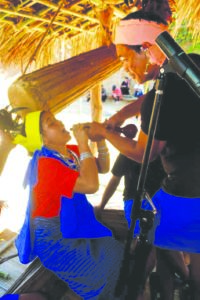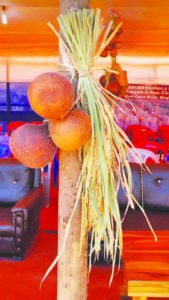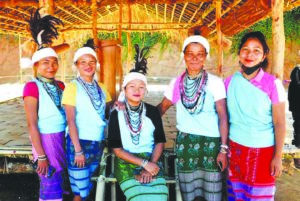TURA, Nov 13: Visitors thronging the 43rd Hundred Drums Wangala Festival at the new site, where the celebrations of the post-harvest festival have begun, will witness, for the very first time, the ancient war dance of the Garos, which is being presented by a troupe during the grand finale on Saturday.
This year’s celebration is curtailed for the first time, all thanks to COVID pandemic, and the annual event of the beating of hundred drums by the ten participating troupes will not take place. Instead, only the first three winners of last year’s celebration — Sadolbra, Gondenggre and host Chibragre village — will be presenting the Wangala dance.
The celebrations kick-started on Friday afternoon at the proposed permanent site of A’chik Heritage Village named as Wangala A’dam in Chibragre, 11 kilometres from Tura, with the traditional Rugala celebration being conducted by the village chieftain or Nokma.
Attended by GHADC Chief Executive Member, Dipul R Marak, and scores of visitors, the Rugala ceremony took place with the offering of the special rice beer along with cooked rice and the vegetables to the God Misi Saljong or the Great Giver.

The war dance — a ritual celebrating the return of the Garo warriors from a head hunting trip in ancient times — would have the warriors proudly narrating their conquest of enemies through songs and dances as they are welcomed by the elders and families after their trip.
The war dance called Torea in Garo will be presented by a male only dance troupe from Rombagre village of East Garo Hills.
Meghalaya Assembly Speaker Metbah Lyngdoh, who had earlier cancelled his proposed visit to the festival, has now decided to attend the finale as chief guest on Saturday. He will also witness the Sa’sat Soa or burning of incense ritual during the programme.
Earlier on Friday, Dipul, who attended the programme as the chief guest, expressed joy over the celebrations and reminisced about the first-ever Wangala Festival that took place way back in 1976. “This was made possible, all thanks to the concerted efforts of the people of the region to preserve the culture and traditions of the Garos,” he said.

Appreciating the support and contribution of the people for going forward in making this place a Heritage Village of the Garos, he urged everyone to not forget “the cultures and traditions of our forefathers and keep our identity intact with our roots.”
Dipul also insisted the members of the committee to collaborate with the Garos living in other parts of the region and support them in preserving their cultures and traditions.
Working Chairman, Hundred Drums Wangala Committee, Ronald Rikman Sangma, said the festival is being organised at the proposed permanent site for the first time from the traditional venue of Asanang in a low-key affair. He added that it is a matter of great pride for every Garo since the festival can be celebrated uninterrupted with a view to preserve and showcase the rich cultures and traditions of the tribe.
Informing that despite the hardships endured by the committee while relocating the celebrations to this site, he said necessary preparations are on and the project is expected to be completed in less than a year against the stipulated time.

Plastic-free zone
In a first, the venue of Wangala Festival has been declared a plastic-free zone by the organisers to create awareness about the impact of pollution on the planet.
Visitors were requested to try and avoid bringing plastic bottles and other items to the celebration. A small fee is also being collected from anyone who brings in plastic water bottles and the money is reimbursed when they leave with their stuff.
To highlight the importance and abundance of locally available organic products, vegetable gourds and bamboo mugs have been made available for people to drink water. Even the water containers put up at several points of the venue are traditional earthen water containers made by Garo Hills-based local artisans.



